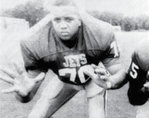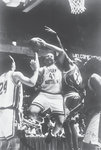


SILER CITY — Joey Walden remembers Judgment Day like yesterday.
The buildup. The buzz on campus beforehand. And the people filling every nook and cranny of Kenan Stadium on Nov. 8, 1997, to watch No. 5 North Carolina host No. 3 Florida State.
So. Many. People.
“The tension for that game was amazing,” Walden, a former Jordan-Matthews and UNC defensive lineman, said in a recent interview. “We were both undefeated. I mean, it’s hard to describe. It was so exciting. We lost, but …” — he paused here, searching for the right words — “it was just incredible.”
A redshirt freshman, Walden never saw the field that night as the Seminoles beat the Tar Heels, 20-3. But the atmosphere alone told him one thing: this is what it’s like to be atop the college football world.
“That Florida State game? That was the game,” he said.
For the next 23 years, North Carolina football never again reached the top of that proverbial mountain despite five coaches (most notably, Butch Davis and Larry Fedora) giving it their best shot.
This fall, things changed.
Last month, the Tar Heels rose as high as fifth in the AP Top 25 Poll — their highest ranking since before the 1997 FSU game — before falling back to earth with two bad road losses to unranked teams. Entering Saturday’s home game against Wake Forest, they’re 5-2 with one of the nation’s best offenses.
The one constant in those two peaks? Head coach Mack Brown. Walden’s plenty familiar with him.
“He’s got some special sauce,” Walden said, laughing. “I don’t know what it is, but it’s a special sauce.”
To figure out why Brown, in his second stint at the school, has so rapidly flipped the switch on UNC’s struggling program in under two years, the News + Record checked in with Walden, 42, who works as an I.T. technician for Chatham County Schools and also owns a recording studio.
Back in the late 1990s, though, he was a lineman who saw firsthand how Brown built North Carolina into a football team to be reckoned with — especially so in 1997, when the team went 11-1.
Walden, who grew up in Siler City, said his path to North Carolina began with Terrence Newby. By high school, Walden’s longtime friend and classmate had blossomed into a two-sport phenom, spending his falls on the football field for Phil Senter and winters on the basketball court for John Phillips.
Power Five schools arrived en masse to check out Newby and became a staple at J-M practices. Soon enough, UNC’s recruiters starting noticing another player, too. Walden was a freaky-athletic defensive lineman who made the jump to Senter’s varsity squad halfway through his sophomore season, in 1993.
He had a tantalizing skillset: plenty of strength, enough speed for a 4.6/4.7-second 40-yard dash and natural footwork that served him well in basketball, where he was a productive and versatile forward.
“Junior year, you start getting letters from different colleges,” Walden said, “and you start to think, ‘Oh, OK, this is actually a possibility.’”
Walden had interest from across the state and beyond, but UNC remained among his top schools: he grew up a Tar Heel fan, his cousin, Eddie Mason, played linebacker at the school and he was — like so many others — drawn to Brown, a coach he described as “a people person” in every sense of the word.
“If you weren’t doing your job, don’t get me wrong, he’d get in your face and chew you out if needed,” Walden said. “But he was a great motivator. And you could always talk to him.”
On a day-to-day basis, Walden also appreciated how Brown delegated tasks to assistants. He was a “coach’s coach,” as Walden put it: someone who took the lead and held people accountable when necessary but also trusted the staff he’d assembled to get things done on their own.
As an example, Walden pointed to Jeff Madden, the Tar Heels’ strength coach at the time. Walden worked with Madden consistently, especially during his 1996 redshirt freshman season. Brown checked in, naturally, but mostly let Madden run the show. The results didn’t disappoint.
“It was wonderful,” Walden said. “He really allowed the coaches under him to coach their positions.”
Brown’s style led to some remarkable highs — and as a player on UNC’s 1996 and 1997 squads, when the team was a combined 21-3, Walden was right in the middle of it. He was there, too, for a tougher moment: when Brown left UNC to become the head coach at Texas in December 1997.
“That didn’t really sit well with a lot of players, but it is what it is,” Walden said. “We understood why. Honestly, I think a lot of us felt like it could have been handled differently.”
Ahead of the 1998 season, Walden said he sat down with UNC’s new head coach, Carl Torbush, and decided “football wasn’t going to be my avenue.” He’d fallen behind academically, didn’t feel the same drive for the sport and, despite offers from smaller schools such as N.C. A&T, was ready to move on.
Over the next two decades, Walden dove into a career of music, sound work and tech. He has worked in IT for CCS since 2012, and he also stays busy with Dub Recording Studio (his own business) and Walden Sound Systems (the longtime Siler City family business started by his late father, Bill).
His reaction when North Carolina fired Fedora and re-hired Brown, now 69, in late November 2018?
“Personally, I was super excited,” Walden said. “I felt like he’d turn it around — and he obviously did. I just didn’t think it was going to happen this quick."
Reporter Chapel Fowler can be reached at cfowler@chathamnr.com or on Twitter at @chapelfowler.